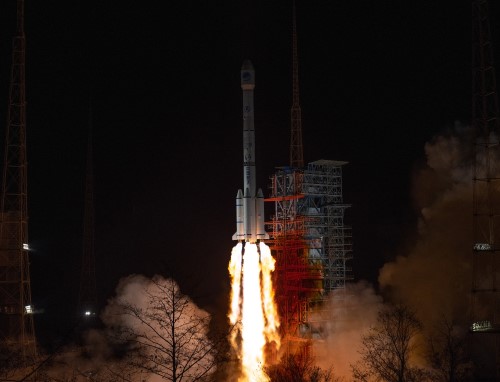Rep. Mike Rogers (R-AL), Chairman of the House Armed Services Committee, released a statement following reports that Putin has called for cooperation between Russia and China on military space weapons.
“Our adversaries are working to rapidly weaponize space. The possibility of Russia and China joining forces against us in space is only the latest example of why we must continue our efforts to strengthen and expand our space capabilities. We must ensure freedom of action in space and counter efforts by those like China and Russia who seek to attack our forces in and through space.”
In September, Air Force Secretary Frank Kendall presented a detailed analysis of why China is America’s preeminent security threat and why the Air Force and Space Force must modernize and adapt quickly. “We must be ready for a kind of war we have no modern experience with. China has been reoptimizing its forces for great power competition and to prevail against the U.S. in the Western Pacific for over 20 years. China has been building a military capability specifically designed to achieve their national goals and to do so if opposed by the United States.” Kendall noted that China has created two new military services, including a Rocket Force specifically designed to attack America’s high value assets, aircraft carriers, forward airfields and key C2 and logistics nodes. The second service, known as “Strategic Support Forces,” are designed and equipped to achieve information dominance in the space and cyber domains.
China is benefitting from Russia’s long space history, and iota antagonism against the west. According to Alexander Gabuev, senior fellow and chair of the Russia in the Asia-Pacific Program at the Carnegie Moscow Center in a Voice of America report, “Russia’s schism with the West and deepening confrontation and competition between China and the U.S. as two superpowers is definitely contributing to rapprochement between Moscow and Beijing. There is a natural economic complementarity where Russia has (an) abundance of natural resources, and China has capital and technology to develop those resources. And finally, both are authoritarian states, so they don’t have this allergy when talking domestic political setup, or the poisoning of (Russian opposition leader) Alexi Navalny, or issues like Hong Kong or human rights in Xinjiang,
The U.S.-China Economic and Security Review Commission, reports that “China has emerged as a leading player in space. The implications for United States policy are numerous, and the capabilities China either currently possesses or is in the process of developing certainly pose a strategic risk to the United States’ ability to operate in the Indo-Pacific region. China’s significant investments in space and counterspace capabilities may prove threatening to U.S. space assets and military efficacy. China’s space infrastructure is complemented by its growing capacity to deny adversarial powers access to the same space assets, as evidenced by advancements in kinetic and non-kinetic counterspace capabilities. China’s approach to modernizing its space presence includes an emphasis on military-civil fusion (MCF) and the development of dual-use technology that buoys both military and economic growth. Should China’s capabilities surpass those of the United States, the erosion of the U.S. military’s ability to contest the PLA in a potential future conflict will be at risk. The Chinese Communist Party (CCP) is executing a long-term strategy to exploit U.S. technology, talent, and capital to build up its military space and counterspace programs and advance its strategic interests at the expense of the United States. China’s zero-sum pursuit of space superiority harms U.S. economic competitiveness, weakens U.S. military advantages, and undermines strategic stability. In short, it represents a threat to U.S. national security. Barring significant action to counter China’s space-related programs and activities of concern, it is likely that this strategic competitor’s efforts will continue to adversely affect U.S. interests.
